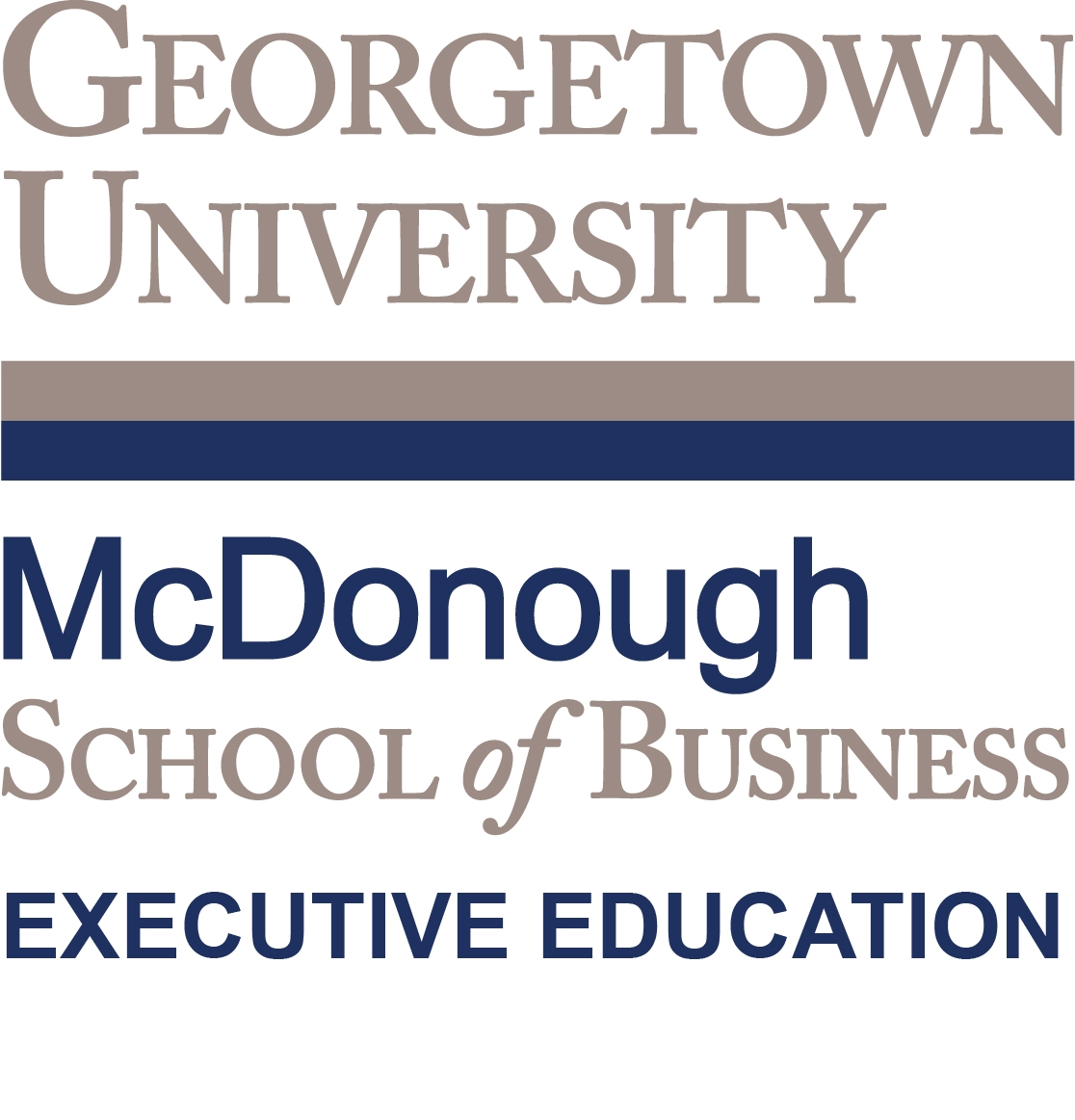- Learning
Paul Almeida in Conversation
Senior Associate Dean for Executive Education at Georgetown University’s McDonough School of Business
Innovation in DC: Exploring the Possible
Paul Almeida is a strategy and international business professor, which gives him considerable depth to draw on in his role as Senior Associate Dean for Executive Education at Georgetown University’s McDonough School of Business in Washington, D.C.
In a recent conversation with IEDP, Almeida outlined his views on the current prospects of business school provision of executive education. “There is little doubt that the percentage of revenues at business schools from executive education is almost always increasing,” he notes, but observes that at the same time the vast majority, some 80-90%, of total development expenditures from corporations is actually spent internally and not with external providers such as business schools. With this realization that business schools are, at best, only accessing 20% of the available executive development budget, what are the implications for their growth and direction over the coming years?
What is clear to Almeida is that open enrolment programs are an increasingly difficult sell, particularly in more developed economies; in emerging economies there is still a strong demand for generic open enrolment programs such as Finance for Non-Financial Managers and Marketing programs. “There may still be space to grow in places like Asia and Latin America where the industry is less mature,” Almeida predicts, “but standard open enrolment programs are going to decrease in revenue or decrease in contribution percentage because there is going to be so much competition [in mature economies].”
With this in mind Almeida has reshaped the department around what would make the school attractive to clients. By honing in on Georgetown McDonough’s particular strengths, he studied what “would give the school a good chance of being able to compete successfully. “This meant mostly focusing on degree programs,” he explains. “Even though we were barely players in the custom field, our future was going to be in the customized programs that played to Georgetown’s strengths. So we ended the few open enrolment programs that we had and focused on the degree and customized side”.
Georgetown McDonough’s strategy is as healthy as it is unusual. Many business schools position themselves as able to provide programs across all business subjects with equal competence, however, Almeida saw that being “a latecomer in a mature and undifferentiated field is the worst possible market in which to try and make money.” So Georgetown escapes remaining as part of the undifferentiated herd through its approach of promoting its specific strengths and advantages.
“The real danger in executive education” observes Almeida, “is to go after the marginal customers – the ‘build the programs and the customers will come’ approach. That only works when there is no real competition. But specialization that plays to your strengths in the right playing field will lead to sustainable success.”
For Almeida it is absolutely clear where Georgetown McDonough’s strengths lie. He notes that the school is international – it is, after all, located at the nexus of global business and policy. Almeida says Washington, D.C.’s global nature stretches beyond the embassies and the governments they represent to multinational companies, strength and depth in international affairs, public policy, and international relations with a focus on how advocacy and lobbying work. “Core to the McDonough offering,” he said, “is how business can manage these public bodies, both in the US and further afield.”
Combine this with the school’s connections to Georgetown University’s prestigious Law Center, the Walsh School of Foreign Service and the McCourt School for Public Policy, and the business school becomes a hub of expertise for large and internationally expanding organizations to tap into. Almeida’s differentiation focus is a bold strategy, but one that makes particular sense for a business school with such clear strengths, both academically and geographically. As a result, McDonough’s custom executive education provision has grown substantially in the last half decade.
“I think we probably are among the fastest growing executive education programs anywhere in the last five years – and our programs are prestigious,” Almeida said. “We were not even eligible for the Financial Times custom education rankings three years ago and now we are number five among US business schools. All this indicates that there really is a demand for specialization that potential clients value.”
To ensure that this specialization focus does not become diluted, Almeida has three criteria for potential custom programs: 1) Do programs enhance the school’s prestige in existing market segments – whether that be geographically, by industry sector or functional area? 2) Will the program allow McDonough to be innovative or be in some way predictive of the future and not the past? 3) Does the program play to the university’s capabilities, either current or likely future ones?
Expanding on McDonough’s specialization strengths, Almeida seeks to leverage Georgetown’s expertise in international business and international affairs, its location in Washington, D.C. – and how Washington works differently from any other major city.
“People need to understand how advocacy is done, how lobbying matters, what the relationships are between businesses and governments, as well as how policy is created with the US government or with multi-lateral institutions like the IMF and the World Bank and the IFC,” Almeida says. “How does this mix relate to the challenges of businesses and governments? And who else can do this other than Georgetown?”
So Almeida is concentrating on providing excellence in these areas, and also on those who value these areas. That is the strategy professor’s clearly identified strategy.
While the McDonough School of Business may be new to the custom executive education sector, the school was established out of Georgetown University’s School of Foreign Service in 1957. Going back even further, Georgetown University was founded in 1789, just over a decade after US Independence, by John Caroll, America’s first Catholic bishop. The McDonough School of Business embodies Jesuit traditions of globally minded and principled leadership, service to business and society, and care for the whole person are woven through the curriculum and culture of each program at the school.
For Paul Almeida, though, it is not the depth of the school’s history that makes McDonough special, but the depth of its research. Research is what sets leading business schools apart from the rest of their competitors – corporate education, the consultants, coaches and increasingly corporate universities. Almeida is sensitive to the perception that business schools can be too focused on theory, and that reams of academic research papers certainly do not engage an executive audience looking to make sense of ambiguity and complexity.
Almedia feels that research is his program’s greatest strength. “Research is incredibly valuable,” he says. “We have to push our effort more to make research relevant with an emphasis on translating our research into what it can mean for the business, government or corporate worlds. Clients really want to access faculty who can do this. Anyone can organize a simulation or game, but at the end clients want to know what is empirically valid, not just what they feel sounds good.”
Looking more closely at some of those clients, Almeida observes that corporate universities are skilled at scalable training – teaching standardized content to large numbers of people. “Where corporate universities are always going to struggle is in putting together programs for senior people in eclectic fields,” he notes. “For example, what corporate university is going to be good at putting together a program on ‘stakeholder engagement in complex territories’? It is hard for them to establish any level of expertise in these things and deliver it with any level of sophistication.”
As a result, Almeida says that is when corporate universities should partner with schools like McDonough – when they realize they may not be at their strongest. “When you need to have a world expert on international trade, or find out how to get the WTO to work with you, that is where we can help,” he says. “However, where regular universities can go wrong is when they sell faculty. We should not do that. We should sell programs. And that is what we are doing.”
Almeida recognizes academia’s focus on narrow research is misaligned with the business world’s need for cross-functional, real-world business issues. He believes things are improving, but that it will take time for academia to adapt. While he acknowledges that academic research needs to create greater impact in the wider world, he also sees that the need for sophisticated executive education continues to grow.
“If the world was not changing, if it was relatively static, we could probably teach 18-year olds to know what they need to know and practice to succeed,” says Almeida. “But we live in an incredibly dynamic world. Most of us are going to be working until we are 70 or even 80, and across those 60 working years there is going to be so much change – across six months there is so much change. So, we have to push ourselves to keep learning continuously over time. We have to not only learn, but to learn how to learn.”
This is something he sees the top-flight of business schools being uniquely good at and something that McDonough is well placed to continue to deliver and advance. “If you use multiple methods of teaching, get program participants to explore, make their minds more agile, make them absorb a wider set of contexts and considerations from the world they are in, allowing them to apply logic and mental manipulations along the way, you are setting them up on that learning journey,” he says.
“This is why I believe so many executive education programs need to change,” he observes. “If there were six nuggets of information you needed to succeed, then fixed programs would be fine. But if we are saying there are myriad locks and myriad keys then that is different. We are creating learning flexibility in their minds, and an openness to absorption through osmosis – then our programs need to be so much more sophisticated than ten years ago to allow that.”
Almeida points out that he is in the business of executive ‘education’ – not training or studies. His goal is for participants to think and learn, so he engages them through multiple approaches, including simulations, cases, debates, and discussions, as well as readings and telling stories.
“This is all to get their minds flowing in new ways,” he explains. “Rather than keeping them happy, I like my students to leave class feeling slightly unsettled. I want them to keep asking questions. The point of executive education is not to make people happy but it is to make sustainable changes in people – and therefore their teams and organizations. It means creating a certain level of discomfort and uncertainty – and questioning where they are going into the future.” Almeida wants his students to ask questions, think differently, and explore, which is why he feels that McDonough’s programs fit well with the idea of liberal studies and the philosophy of Georgetown University.
For Almeida the opportunities for executive education remain large, he concludes by closing the circle on his opening thoughts. “This is an exciting time to be in executive education because of all the changes. I think the rewards are going to go to people who are willing to be innovative and explore what is possible. The worst thing you can do is to imitate someone in the wrong place, badly, and too late – and too many people are doing that.”
For further information you can visit Paul Almeida's faculty profile page here
This article was originally published in Developing Leaders Issue 20
Since its founding in 1957, the McDonough School of Business has garnered global recognition for excellence in international business.
ARTICLES YOU MIGHT LIKE
VIEWPOINT
For Thomas Misslin, transformation rather than training is the aim of executive education at emlyon business school
DEVELOPING LEADERS QUARTERLY MAGAZINE AND WEEKLY BRIEFING EMAILS


































